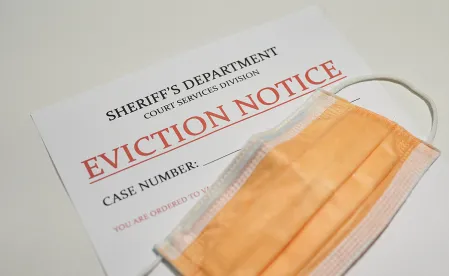Yesterday, the United States Supreme Court nullified a nationwide residential eviction moratorium that has been in place for nearly a year. Alabama Association of Realtors v. U.S. Department of Health and Human Services, 594 U.S. ---- (2021)
Last September, the Centers for Disease Control and Prevention (CDC) ordered this nationwide moratorium, citing authority it said granted sweeping powers to limit the spread of the SARS CoV‑2 virus. 85 Fed. Reg. 55,292. Specifically, the CDC said it could enact the order as a measure it deemed “necessary” to achieve its goal of limiting the spread of the novel coronavirus. See 42 U.S.C. § 264(a) (referred to as § 361(a)). Challengers argued that the order exceeded the scope of authority Congress had vested in the CDC under § 361(a). Nonetheless, this order remained effective until its July 31, 2021 expiration date. Three days after it lapsed, the CDC replaced it with a new one. 86 Fed. Reg. 43,244.
On August 26, 2021, the Supreme Court agreed with the parties challenging the CDC’s orders. Saying that it “strains credibility to believe that this statute grants the CDC the sweeping authority it asserts,” the court found that the CDC’s broad interpretation of its mandate could permit dramatic administrative overreach. To illustrate this, the court posed several hypotheticals: “Could the CDC, for example, mandate free grocery delivery to the homes of the sick or vulnerable? Require manufacturers to provide free computers to enable people to work from home? Order telecommunications companies to provide free high-speed Internet service to facilitate remote work?” To the contrary, the court found that § 361(a)’s second sentence was instructive as to the types of measures the CDC could implement, which focused strictly on “measures [that] directly relate to preventing the interstate spread of disease by identifying, isolating, and destroying the disease itself.” Here, the CDC’s remedy was too attenuated.
“It is up to Congress, not the CDC, to decide whether the public interest merits further action here.” Indeed, “Congress was on notice that a further extension would almost surely require new legislation, yet it failed to act in the several weeks leading up to the moratorium’s expiration.” Even if the CDC was faced with legislative inaction and motivated by “desirable ends,” “our system does not permit agencies to act unlawfully[.]” See also Youngstown Sheet & Tube Co. v. Sawyer, 343 U.S. 579, 582, 585-586 (1952).
Given all of this, the court determined that the parties challenging the moratorium “not only have a substantial likelihood of success on the merits—it is difficult to imagine them losing.” Accordingly, the court vacated the stay on the District Court’s decision holding the CDC order invalid.
Critically, this decision is not a blanket nullification of any other moratoria that may be in effect (including state and local moratoria), nor does it affect any practical limitations on the exercise of remedies, such as the inability to hold a public sale necessary to foreclose in certain jurisdictions. It also leaves open the possibility of further congressional action.





 />i
/>i

